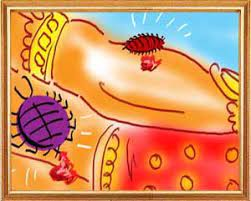The story of the Bird with Golden Dung
There was a big
tree over the mountain side. There lived a bird by name Sindhuka on its branch. Whenever it dropped its residue that turned
into gold. One day, a hunter came to
that spot. As soon as he came, he got astonished
on watching that bird dropped its residue which turned as gold. Then he thought thus: “Over these years, I have
hunt and caught many birds but I have never seen like this. By thinking so, he spread the net to trap the
bird. The foolish bird Sindhuka without
knowing it, sat on the place where the net was spread and got trapped. Then it was caught by the hunter
immediately. Then the hunter freed the
bird from the net, caged it and brought to his hut. Then he thought thus: What is the use of killing
this bird? If anyone knows this, it will
be reported to the king and will lead me to danger. So, I myself shall take this bird to the
court of the king.” Then he did so.
On watching the bird, the king got surprised and also delighted. Then the king ordered the guards thus: Look
after this bird carefully. Rear up it well as per its wish.
At this juncture, a wise minister said to the king thus: “Oh!
King! What is the purpose of having this bird? How can this bird yield the gold instead of eggs
and droppings? Please release this.
Being released by the king, as advised by the minister,
the bird sat on the lofty arch of the main entrance and dropped the residue which
turned into gold. Then the bird this
“Poorvam thaavadhaham moorkho dvitheeyaf paasabandhakah l
Thatho raajaa cha manthree cha sarvam vai moorkhamandalam
ll”
At once I was a fool. Then I got trapped in the net due
to my foolishness. Then the king, the
minister and also the guards became fools after me.
Moral of the story:
“Gathaanugathika lokah na lokaf paaramaarthikah”
No one in this world think up to their real
knowledge. On the contrary every one
simply follow others in their actions.
(This story is
taken from the titled Kaakolookeeyam - the 3rd volume of the book PanchaThanthram
which has five volumes viz.,
MitraBedhah, MitraLaabhah, Kaakolookeeyam, Labdhapranaasam
and AparikshitaKaarakam written by Vishnu Sarma was an Indian scholar. The exact period of the
composition of the Panchatantra is uncertain, and estimates vary from
1200 BCE to 300 CE.
(#WriteAPageADay, today's word count = 360)
This is a part of
Blogchatter's write a page a day campaign.













